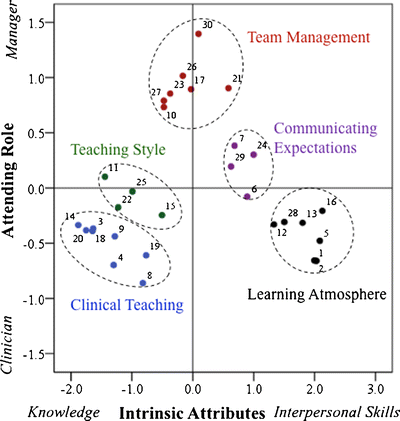This is devoted to all preceptors who teach students in the clinical setting. It is a collection of articles, blog posts, and videos I have found over the years that will help you be the best preceptor possible for your learners.
Online Programs to Improve Clinical Teaching
Free Online Certificate Program for Clinical Supervisors
Online Medical Educator Course with CME
Sir William Osler: On Full-Time Clinical Teaching in Medical Schools
Defining the Key Roles and Competencies of the Clinician–Educator of the 21st Century
What makes a good clinical educator?
A Systematic Review on Interventions Supporting Preceptor Development
Clinical Teaching: widening the definition
Clinician Educator: The agent for change in medical education
Clinician-Educators as Dual Professionals: A Contemporary Reappraisal
Defining the Key Roles and Competencies of the Clinician–Educator of the 21st Century
Effective supervision in clinical practice settings: a literature review
How to Nurture Strengths in Medical Students
Mastery Learning: It Is Time for Medical Education to Join the 21st Century
The Charismatic Journey of Mastery Learning
Practical (but evidence-based) Clinical Teaching That Doesn’t Suck
Preceptor teaching tips in longitudinal clerkships
Role modelling in medical education: the importance of teaching skills
Teaching in the medical setting: balancing teaching styles, learning styles and teaching methods
The role of the assessor: exploring the clinical supervisor ’s skill set
db’s Medical Rants – Clinical Teaching
db’s Medical Rants – Teaching Style
db’s Medical Rants – Learning Atmosphere
How do medical students perceive clinical learning climate?
Would Socrates Have Actually Used the “Socratic Method” for Clinical Teaching?
Tips on Becoming a Supreme Educator
An Effective Preceptor – For Community-Based Teachers
Using the cloud to enhance clinical teaching
Techniques and behaviors associated with exemplary inpatient general medicine teaching
How to connect classroom and workplace learning
The clinical educator and complexity
Comparing effective teaching in clinical education
The clinical educator’s guide to fostering learner motivation: AMEE Guide No. 137
Teaching Clinical Decision Making
Entrustment Decision Making in Clinical Training
Educational Strategies to Promote Clinical Diagnostic Reasoning
Clinical diagnostic decision-making in real life contexts: A trans-theoretical approach for teaching
Five Microskills for Clinical Teaching
Twelve tips for teaching expertise in clinical reasoning
Medical education should teach heuristics rather than train them away
Promoting clinical autonomy in medical learners
Bedside Teaching
Teaching in the Hospital: The 4Ds of Rounding
Bedside Teaching Rounds Reconsidered
Bedside teaching: specialists versus non-specialists
How to Improve Your Bedside Teaching: Learn from the “pros”
Redesigning Rounds: Towards a More Purposeful Approach to Inpatient Teaching and Learning
Socrates Was Not a Pimp: Changing the Paradigm of Questioning in Medical Education
Teaching Humility at the Bedside
Lessons Learned from A Peer Review of Bedside Teaching
Teaching When There is No Time: A Review of the One-minute Preceptor Model of Clinical Teaching
Using Cognitive Mapping to Define Key Domains for Successful Attending Rounds
Bedside teaching with unwell patients: Can it ever be appropriate?
Medical students’ perceptions of bedside teaching
How physicians teach in the clinical setting: The embedded roles of teaching and clinical care
Medical Students’ Understanding of Directed Questioning by Their Clinical Preceptor
Not Another Bedside Lecture: Active Learning Techniques for Clinical Instruction
Communication and Feedback
db’s Medical Rants – Communicating Expectations
How to Give Feedback to Medical Students
R2C2 in Action: Testing an Evidence-Based Model to Facilitate Feedback and Coaching in Residency
Guidelines: the do’s, don’ts and don’t knows of feedback for clinical education
Feedback in Clinical Education: Untying the Gordian Knot
Feedback: ensuring that it leads to enhanced learning
Feedback-giving behavior in performance evaluations during clinical clerkships
MERDE: Topics for Clinical Feedback
Reflections on Feedback: Closing the loop
Feedback to Supervisors: Is Anonymity Really So Important?
The failure to fail underperforming trainees in health professions education
Direct Observation of Clinical Skills Feedback Scale: Development and Validity Evidence
Students’ motivation toward feedback-seeking in the clinical workplace
Feedback for Learners in Medical Education: What Is Known? A Scoping Review
Qualitative and quantitative feedback in the context of competency-based education
Gender Differences in Attending Physicians’ Feedback to Residents: A Qualitative Analysis
Qualitative and quantitative feedback in the context of competency-based education
Adapting Feedback to Individual Residents: An Examination of Preceptor Challenges and Approaches
The Art (and Artifice) of Seeking Feedback: Clerkship Students’ Approaches to Asking for Feedback
Identifying coaching skills to improve feedback use in postgraduate medical education
Examiner training: A study of examiners making sense of norm-referenced feedback




